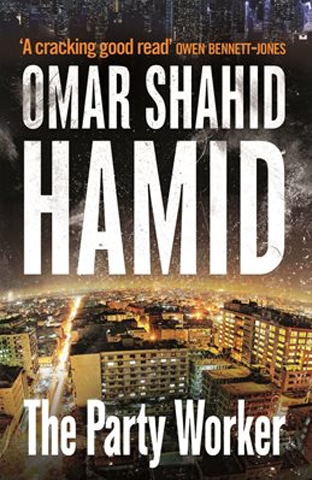
When an incidence of homicide takes place in New York in which a 65-year-old Jewish woman is killed and three other people besides the intended victim are injured, a New York Police Department (NYPD) cop and his partner set about trying to solve the case. The intended victim, Asad Haider, has betrayed the “Party” for which he worked for 28 years and he is now being made to pay the price. Initial investigations lead the cops to Mohammad Ali Pichkari, the self-exiled leader of the United Front Party, a Pakistani political outfit. Pichkari, commonly known as the Don, is the uncrowned king of Karachi.
Thus opens The Party Worker by Omar Shahid Hamid, the third book by the author of best-selling crime fiction novels The Prisoner and The Spinner’s Tale.
Although the motives for Asad’s betrayal and the reason behind an attempt on his life are answered in the opening chapter, the intrigue grows as the story shuttles between New York and Karachi. In Karachi, several people are working to bring about the downfall of the Don. These include an 80-year-old Parsi businessman whose son has been a victim of the party’s militant wing; an ambitious journalist who dreams of making it big through blackmail and other nefarious means; a gangster who seems to be the only opposition to the party; a young woman who wants to avenge the murder of her police officer brother; and a police-officer who is back in the city after serving for a long time in far-flung areas as punishment.
A daring new novel takes an obvious shot at real life
In the beginning, there seems to be no connection between these various characters and situations, but as the story develops the pieces begin to fit together like a jigsaw puzzle. The characters are all moving towards the same goal, following one man’s cleverly drawn plan.
The setting of the story is a city held hostage by a political party run by a charismatic but ruthless leader. The Don begins his political journey as a young man in Karachi speaking out against Islamic radicals. He gains immense popular support and power, but is forced to leave Pakistan after receiving threats to his life. Despite having been away from the country for more than a decade, he continues to exert an iron grip on his party and the city he rules, and has the power to paralyse daily life with strike calls. Nobody dares to openly disagree with the Don. Anyone whom he considers a threat or a nuisance is assassinated on his orders by the party’s militant wing which strikes terror among the citizens, murdering, torturing, and extorting with seeming impunity.
Such is the terror of the Don’s wrath that Asad, the party’s chief hitman and the Don’s right-hand person, fears for his safety after his betrayal. Asad has obeyed the Don’s every command, killing or arranging the killing of — as he himself reveals towards the end of the book — hundreds of people, including dissenting party workers. His absolute obedience is “Because I believed in him. I believed in him more than I did in God,” as he tells NYPD officials. But one act of his, a single betrayal — his refusal to kill Aleem, one of the founding members of the party, sentenced to die just because the Don felt he was conspiring against him — almost costs Asad his life. He cannot bring himself to kill Aleem, and his refusal prompts the Don to order his elimination.
The extent of the Don’s power is revealed when it transpires that not only does he control his party from the United States, but also has allies such as the CIA officer Simon Sole, from whom he receives favours in return for services. Some details are revealed by Asad in his confessional statement to the NYPD officials: “We find things for you. Things, documents, people. You tell us what to look for and we find it. Sometimes, we also clean up for you.” Elsewhere Asad admits: “We occasionally kill people that are of interest to your government.”
In a sort of flashback we get a glimpse of Asad’s background — he belongs to a respected family which migrated from Lucknow in India. The matriarch of the family exerts a strong hold on her clan that cherishes its traditions, especially of the observance of the holy month of Muharram. But as Asad tells the Don: “There’s another tradition in the family, of the men falling off the wagon.”
When he tries to leave the party he is lured back by the Don himself who uses not pressure or force, but charm and special power to convince.
The author of The Party Worker has been a police officer for 16 years and is currently a senior officer in Karachi Police’s Counter Terrorism Department. In 2011, after an attack on his offices by the Tehreek-i-Taliban Pakistan, he took a five-year break to write books and work as a political risk consultant.
In his novels, Hamid tries to capture the reality of Karachi city as he witnessed it during his work as a senior counterterrorism officer. His first book, The Prisoner, is a portrayal of Karachi through the eyes of the police, while his latest book, The Party Worker, presents Karachi through the eyes of a political worker instead of the police. It shows how politics and violence are interlinked in Pakistan, especially Karachi. In certain ways The Party Worker can be called a sequel to his first book, and some characters who appeared there, such as Akbar Khan and Dilawar Khan, are referred to here.
The story seems to have been modelled on a murder that took place under similar circumstances in London in 2010, and perhaps to avoid the similarities being too obvious, Hamid has set the backdrop of his novel in New York. For readers who have some know-how of Pakistani politics, however, it will not be too difficult to draw comparisons. Hamid seems to be treading a dangerous path; a number of his characters are too identifiable, seeming as they have been drawn closely from real people. Although they were easier to identify in The Prisoner, in The Party Worker, too, one can — to a certain extent — make out who is supposed to be who, although Hamid has taken care to take bits and pieces from several actual people and mix them up into one character.
As a crime thriller, The Party Worker is a bold account of politics and the evils associated with it. It focuses on corruption and duplicity and presents some unpleasant but keen insights into how power is won and maintained in the world of politics. Some readers may find Hamid’s books somewhat rough, with their plentiful swearing and bad language as well as depictions of criminal activity, but then such is the game of politics in our part of the world. At the end though, The Party Worker is an entertaining and gripping read. The pace is wonderfully set and the engrossing story keeps readers glued to the pages.
The reviewer is a member of staff

The Party Worker
By Omar Shahid Hamid
Pan Macmillan, India
ISBN: 978-9382616962
336pp.
Published in Dawn, Books & Authors, April 2nd, 2017















































Dear visitor, the comments section is undergoing an overhaul and will return soon.